This post may contain affiliate links. Please read our disclosure policy.
Making the perfect Prime Rib is easy! A zesty combination of rosemary, Worcestershire sauce, and chili flakes enhances the flavor of this holiday classic, while an easy reverse-sear roasting technique keeps things juicy and tender.
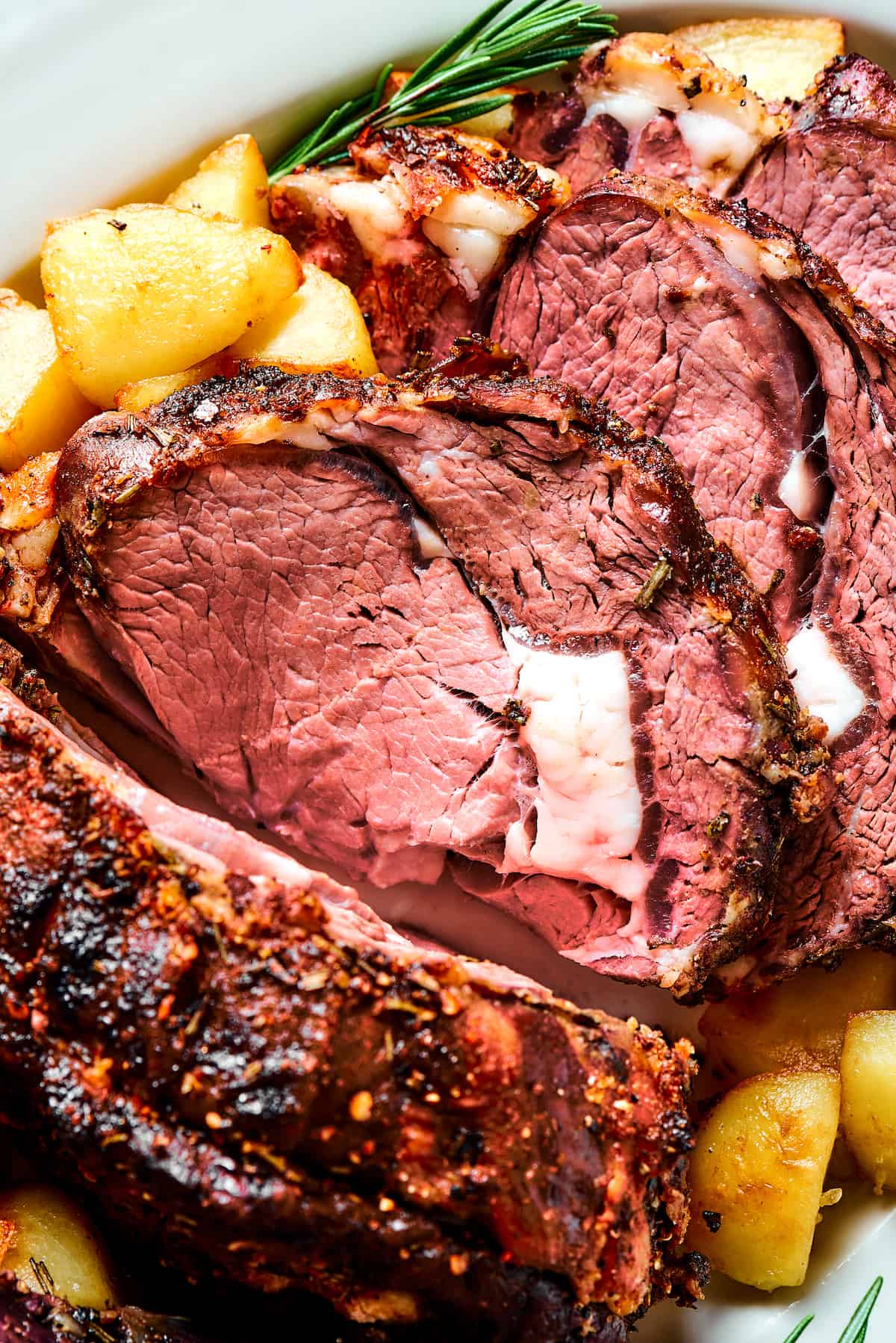
Jump To
- A Christmas Dinner That’ll Knock Their Socks Off!
- What Is Special About Prime Rib?
- The Ingredients You’ll Need
- Let’s Make Prime Rib!
- How Is Prime Rib Supposed to Be Cooked?
- Tips for Success
- Yummy Side Dish Ideas
- How to Store and Reheat Leftovers
- Can I Freeze Leftover Prime Rib?
- Prime Rib Recipe
- More Holiday Dinner Ideas
A Christmas Dinner That’ll Knock Their Socks Off!
The pressure is on during the holidays, isn’t it? Everyone wants to have a great, restful, fun holiday season – but we also want things to be extra-special, extra showy, and in the case of food, extra flavorful. It’s not always easy to pair “easy and fun” with “extra-gorgeous and extra-special,” but in the case of this prime rib roast, you can totally have both!
That’s because prime rib is naturally tender, well-marbled, and delicious, while also being an impressive-looking cut of beef. All you have to do is give it the right roasting technique, and you’ve got a fantastic main course that everyone will rave over. Best of all, that roasting technique is simple.
What Is Special About Prime Rib?
Prime rib is special because essentially, it is a huge bone-in roast that is literally made of ribeye steak! Tender, juicy, and super-flavorful, it is considered by many to be the best cut of beef there is (tenderloin lovers may disagree, of course). If you like ribeye, or any steakhouse cut of beef, you will almost certainly love a good rib roast!
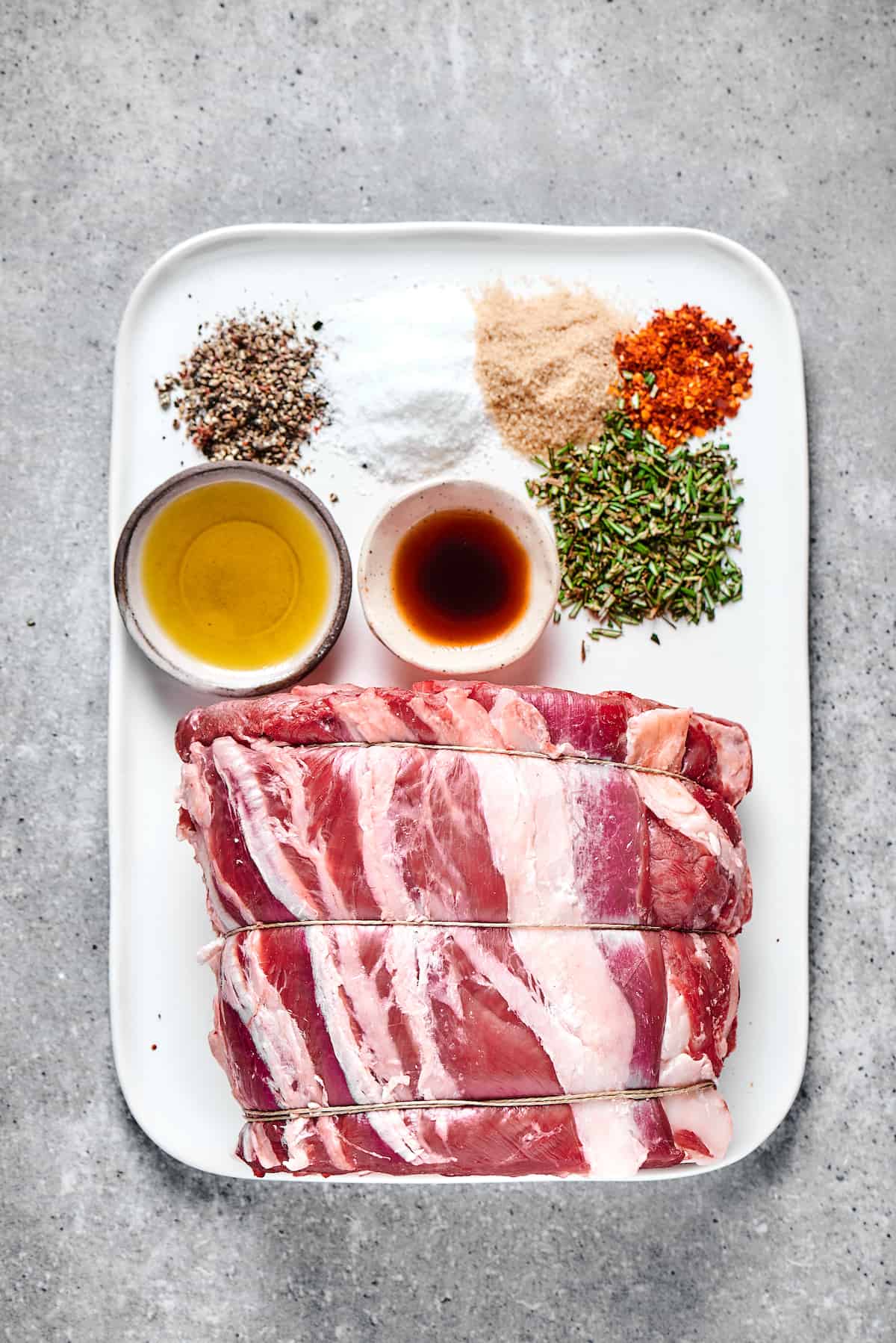
The Ingredients You’ll Need
The ingredients for prime rib can be as simple as a rib roast and some salt, but why stop there? You only need a few additional ingredients to make a beautiful, show-stopping prime rib roast with an herbed crust.
- Rib Roast: Look for a roast marked “prime rib,” “standing rib roast,” or “rib roast.” We are going with a classic bone-in roast for this recipe, about 4 to 5 pounds in weight.
- Olive Oil: Extra virgin is good, but lighter olive oils are also fine.
- Worcestershire Sauce: This pungent sauce is perfect with the robust flavor of the rib roast.
- Salt and Pepper
- Sugar: Just a bit – this gives the crust a gorgeous, deep color.
- Chili Flakes: Or crushed red pepper – or you can omit this, if you don’t like that little spicy kick.
- Fresh Rosemary: Strip the leaves from four sprigs, and chop them up.
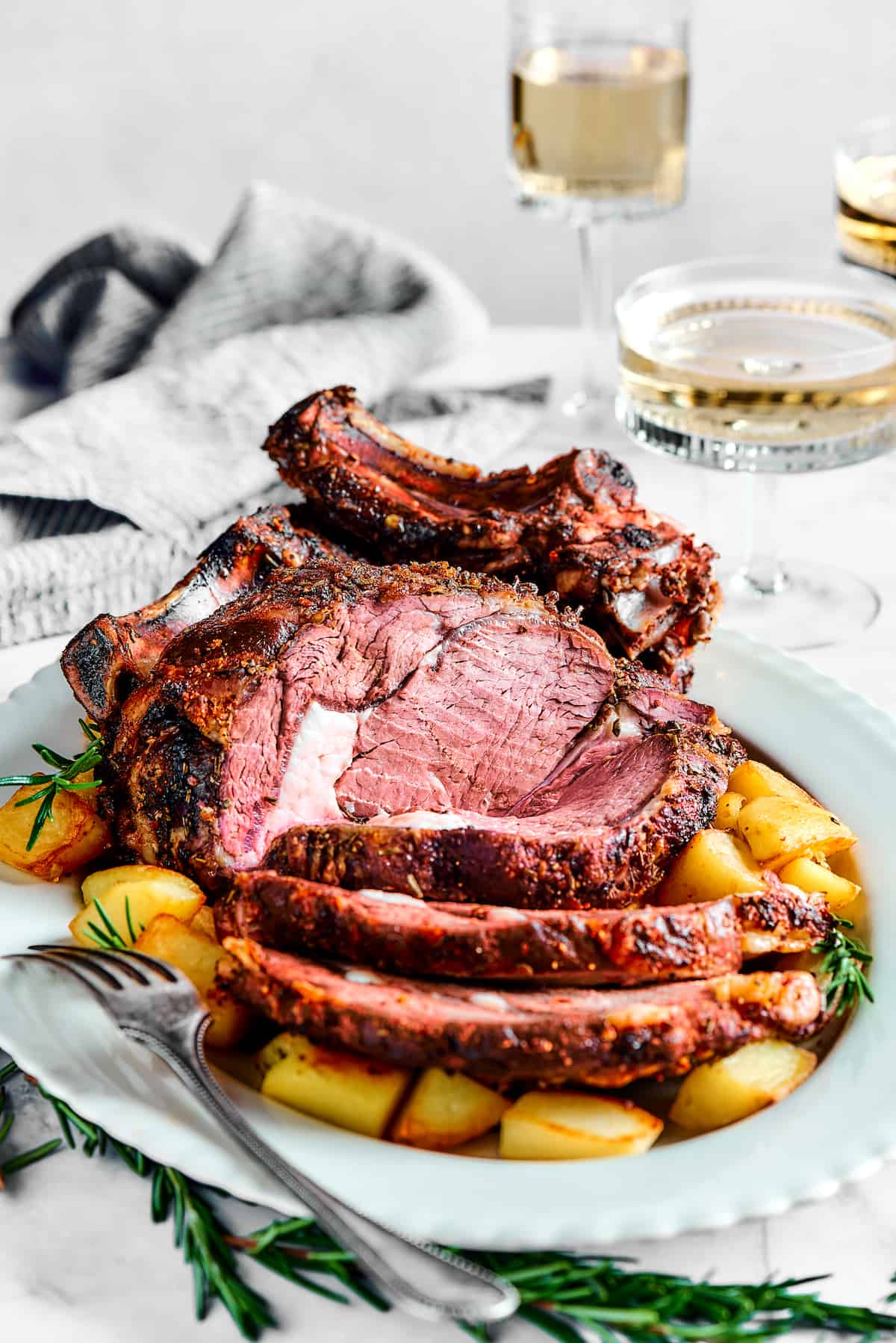
Let’s Make Prime Rib!
This method is a version of reverse sear, meaning we’ll cook it low and slow at first, and then finish it off with a blast of heat to form a nice crust on the outside. Resting time is also crucial, so make sure you allow the meat to rest as indicated.
- Prepare to Cook. You get better results with room-temperature rib roasts, so about two hours before you want to start cooking, take the meat out of the fridge and set it on the counter to come to temperature. Thus give yourself plenty of time to make prime rib.
- Season the Roast. After the two hours is up, pat the meat dry with paper towels. Preheat your oven to 250°F, and add the seasonings to the rib roast. First, pour olive oil and Worcestershire sauce over it, and then sprinkle the salt, pepper, sugar, chili flakes, and chopped rosemary all over the sides. You want the roast to be evenly coated in seasonings.
- Roast at 250°F. Get out a roasting pan fitted with a wire rack, and set the roast on top. Bake in the oven for about two and a half hours, or until the internal temperature hits 125°F in the thickest part of the meat.
- First Rest. Take the roast out of the oven, cover it with foil, and let it rest at room temperature for at least 30 minutes.
- Roast at 500°F. About one hour before you are ready to serve, uncover the meat and preheat your oven to 500°F. Place the rib roast into the hot oven, and let it roast to create a deep brown, crisp crust on the outside – this takes 5 to 10 minutes.
- Rest Again. Again, take the prime rib out of the oven, and place it on the counter. Allow it to rest for one hour before carving and serving.
How Is Prime Rib Supposed to Be Cooked?
Because prime rib meat is juicy and rich without having too much fat, you want to cook it until it’s somewhere around medium. I like to go for medium-rare, but medium is also good. You can do medium-well if you like, but be warned: the rib roast can dry out if you overcook it.
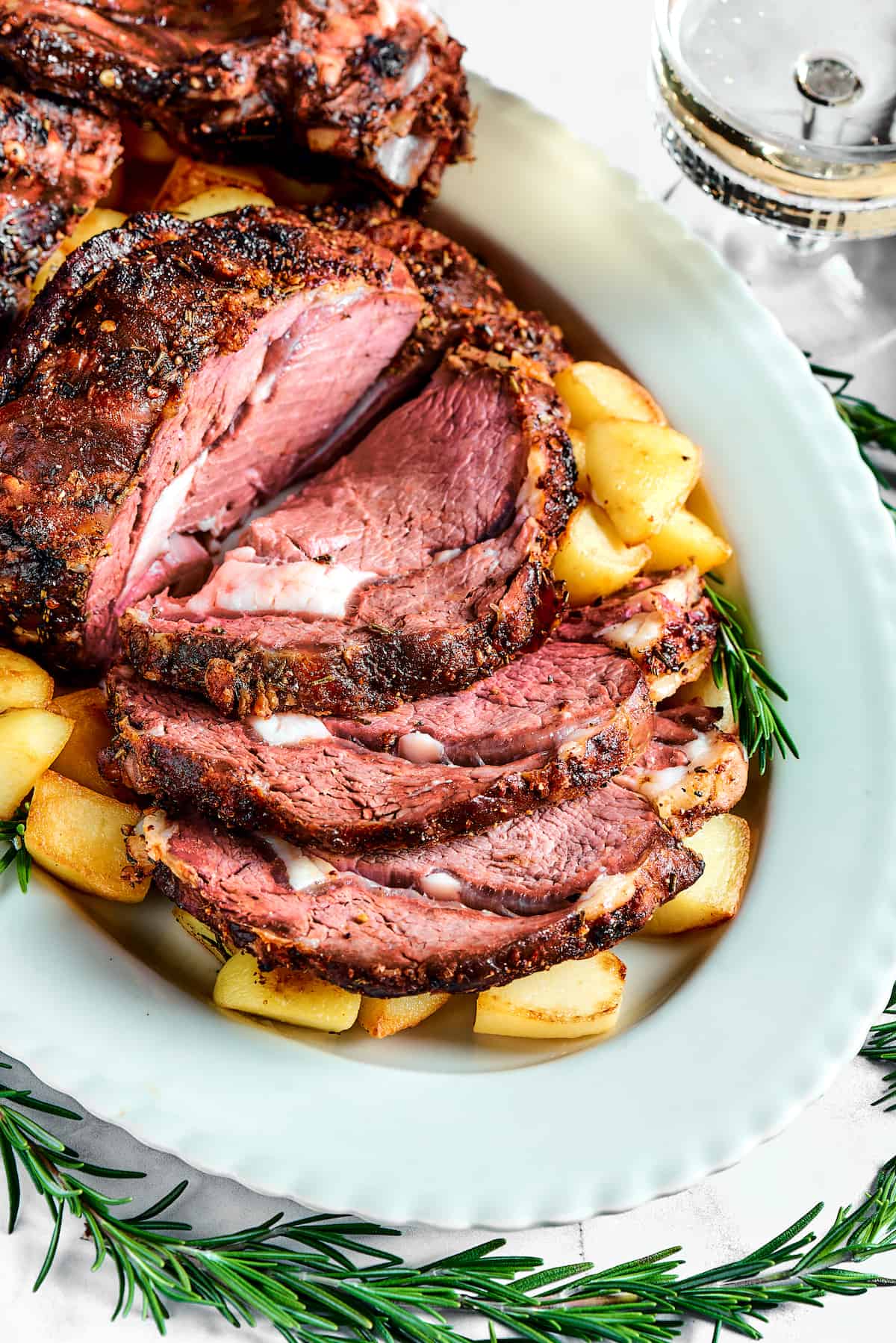
Tips for Success
Most people agree that what makes or breaks a good prime rib comes down to one thing: getting the meat done, but not overdone! Here are my best tips for getting that perfectly cooked prime rib roast.
- Meat Thermometer: Meat thermometers are always handy, but never more essential than when you’re making a major main course like prime rib. Without a meat thermometer, you can only guess what the inside of that roast is like – or else cut deeply into it, to check. That means lost juices, lost time, and potentially a dry, overcooked roast! Save yourself the hassle and use a good meat thermometer, inserted into the center of the meat.
- Doneness: Roast the prime rib until it’s about 3 to 5 degrees from the ideal temperature, and then take it out of the oven. It will continue to cook a bit more while sitting on the counter, bringing it up the last few degrees.
- About Those Temperatures: 130˚F is just about the perfect medium-rare, delivering a rosy pink color. If you want, you can cook the roast a bit more, to 140˚F. This is medium, and still on the pink side, but not quite as dark. 150˚F is dangerous territory! The meat will be much less pink, but it can get dry at this point.
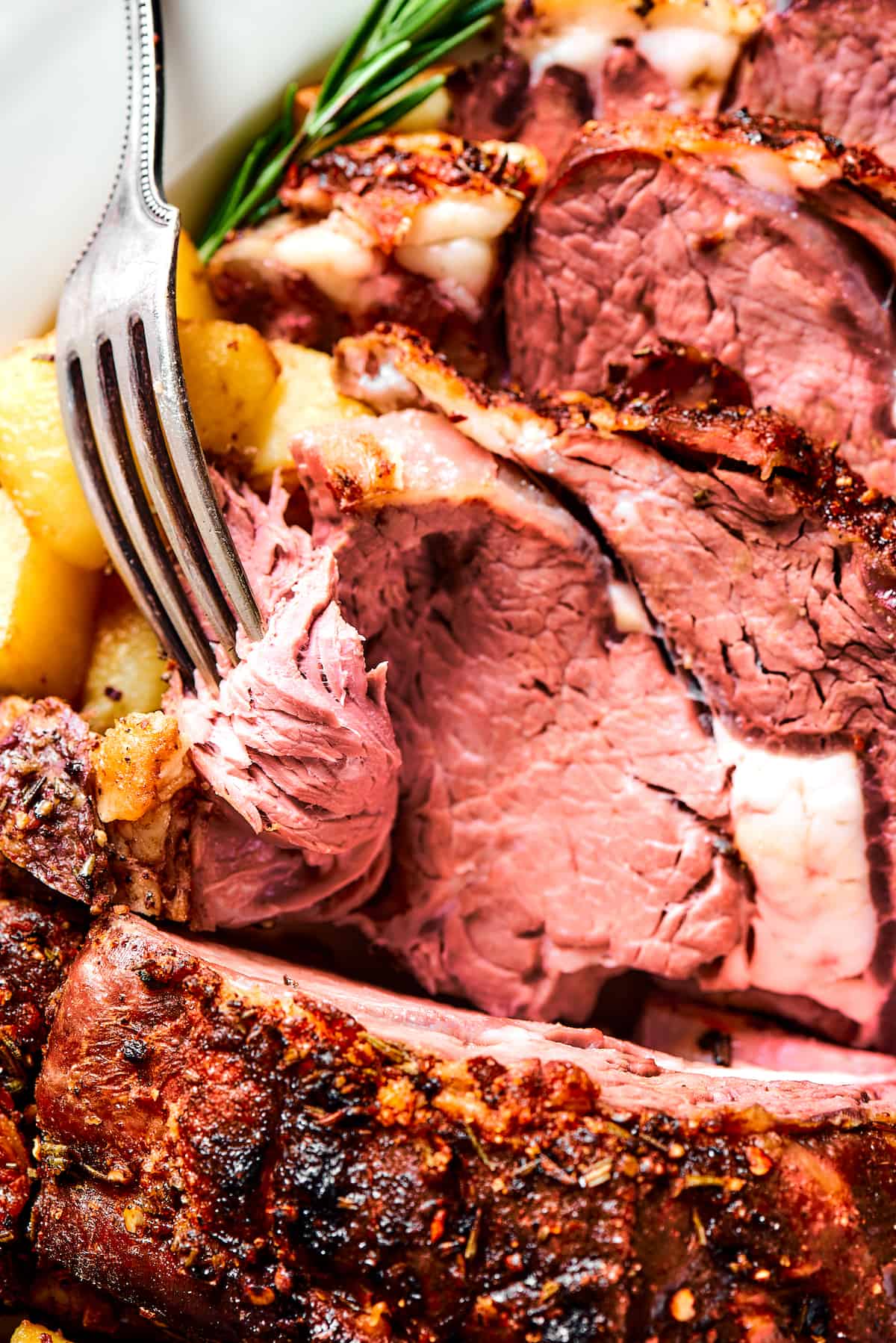
Yummy Side Dish Ideas
You can’t go wrong with side dishes here – almost anything is perfect with prime rib. These hearty, holiday-worthy ideas are just the tip of the side-dish iceberg!
- Macaroni and Cheese: Classic mac isn’t just for a busy weeknight – it’s also a velvety, cheesy masterpiece, if you do it right. This Baked Macaroni and Cheese recipe has all the details.
- Brussels Sprouts: If you had told me as a child that I would grow up to adore brussels sprouts, I would have thought you were crazy! But these cute “mini cabbages” have come a long way, and unlike their bitter, counterparts, Roasted Brussels Sprouts are pretty darn irresistible. Crispy in some spots and meltingly soft in others, these caramelized veggies are just right for the holidays.
- Crescent Rolls: Better make a double batch, because nothing disappears like freshly made Crescent Rolls at a dinner table! If you are lucky enough to have leftovers, try them the next morning with jam, for a simply indulgent breakfast.
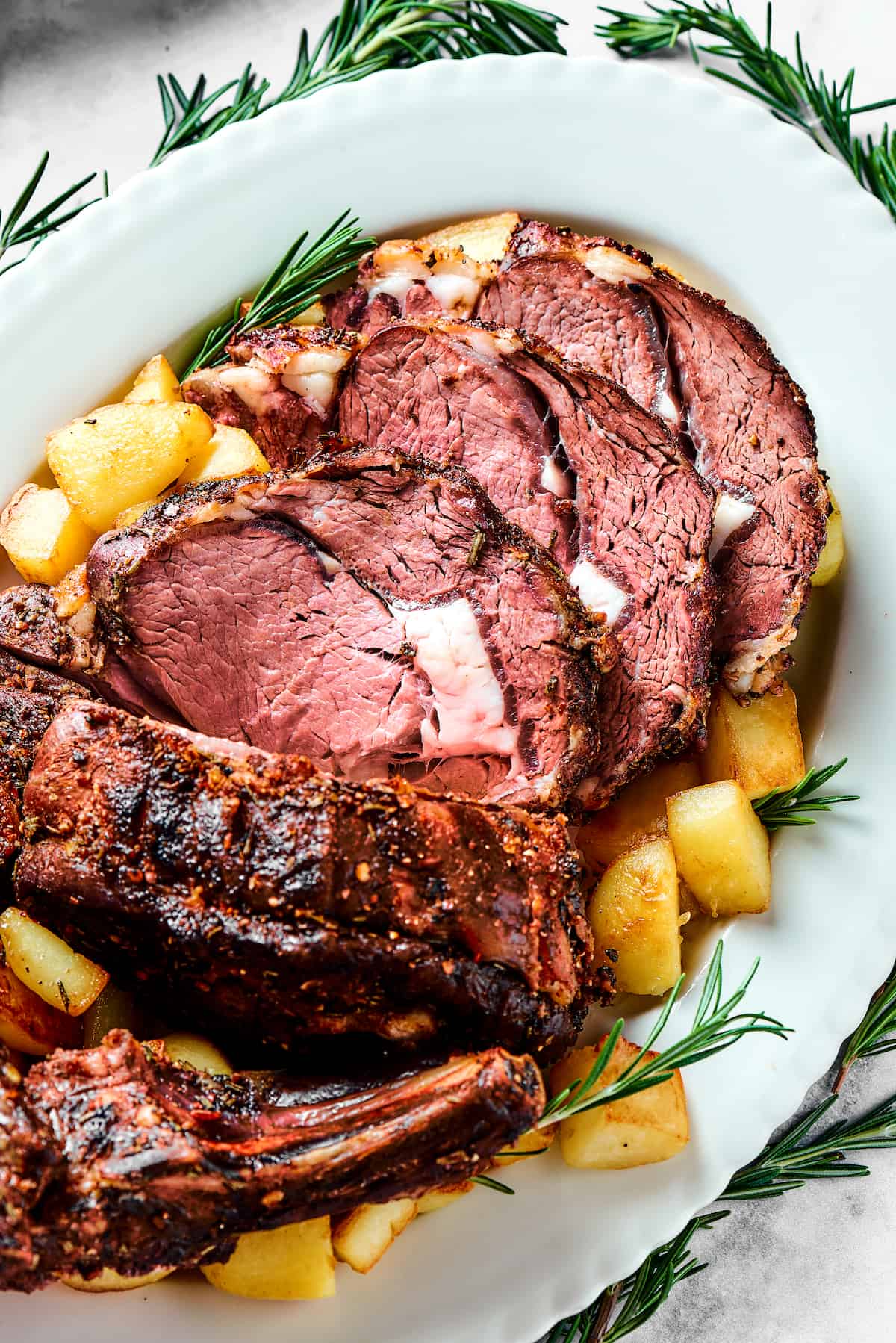
How to Store and Reheat Leftovers
- If you are going to store leftovers, the important thing is to wrap them tightly – especially if freezing (see below). Once the meat has cooled, wrap leftovers in plastic wrap, and store in an airtight container in the fridge for up to 5 days.
- To reheat, you want to warm the prime rib but not continue cooking it. Preheat your oven to 250˚F, and place it in a baking dish with a splash of water or broth. Cover the dish tightly with foil, and bake until just heated through. Depending on the thickness of the pieces, your oven temperature, and your baking dish, this could take anywhere from 10 to 20 minutes.
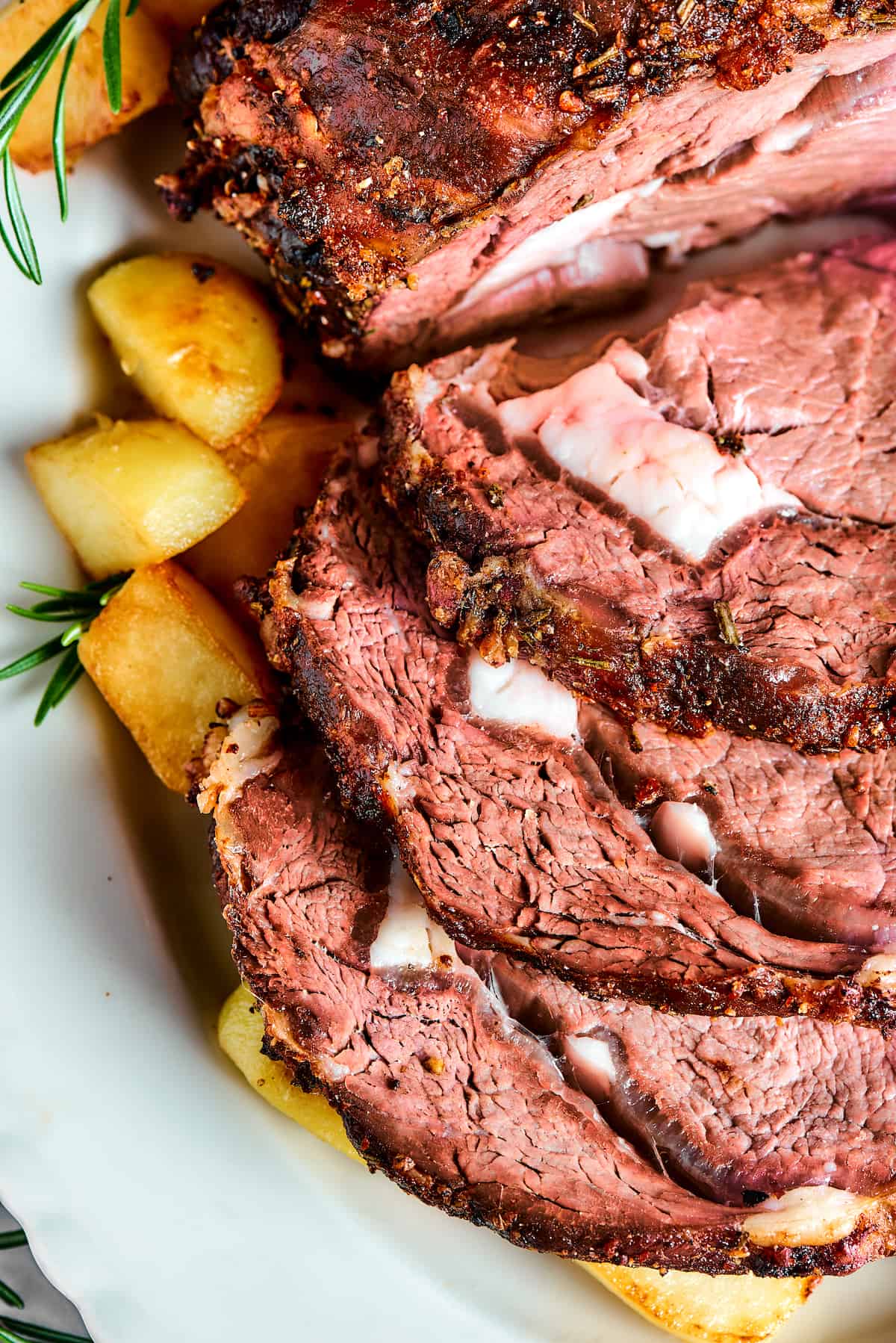
Can I Freeze Leftover Prime Rib?
- Yes, you can! To keep freezer burn at bay, cool the meat down first and then wrap it tightly in plastic wrap. Add a second layer of plastic wrap, or use a freezer bag or some aluminum foil. Mark the prime rib with the date, and freeze for up to three months (the meat will last longer than that, but the quality does degrade over time).
- Thaw overnight in your fridge before reheating.
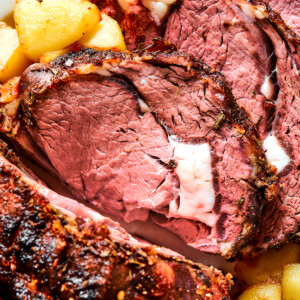
Prime Rib
Ingredients
- 4 to 5 pounds bone-in standing rib roast,, about 3 to 4 ribs
- 2 tablespoons olive oil
- 1 tablespoon Worcestershire sauce
- 1½ tablespoons sea salt
- 1 teaspoon fresh ground black pepper
- ½ tablespoon sugar
- ½ teaspoon red chili flakes,, optional
- 4 sprigs fresh rosemary,, leaves only, finely chopped
Instructions
- Take the prime rib out of the fridge 2 hours before cooking.
- Preheat the oven to 250°F.
- Dry the roast with paper towels.
- Rub olive oil and Worcestershire sauce over the roast, then season with salt, ground black pepper, sugar, chili flakes and chopped rosemary leaves, covering all sides.
- Place the prime rib roast in a roasting pan fitted with a wire rack.
- Roast at 250°F for 2 hours and 30 minutes, or until the internal temperature reaches 125°F in the thickest part of the meat. Use an Instant Read Meat Thermometer to check for doneness.
- Remove the prime rib from the oven, cover with foil, and let it rest for 30 minutes.
- Meanwhile, increase the oven temperature to 500°F.
- Uncover the prime rib and put it back in the oven.
- Roast until browned and crisp on the outside, about 5 to 10 minutes.
- Remove from the oven and let it rest for 1 hour before cutting and serving.
Notes
- Meat Thermometer: Meat thermometers are always handy but never more essential than when making something as good as prime rib. Without a meat thermometer, you can only guess the doneness of your roast.
- Doneness: Roast the prime rib until it’s about 3 to 5 degrees from the ideal temperature, and then take it out of the oven. It will continue to cook on the counter, bringing it up to the last few degrees.
- Prime Rib Temperatures: 125˚F to 130˚F is the perfect medium-rare, delivering a rosy pink color. If you want, you can cook the roast a bit more, to 140˚F. I wouldn’t go beyond 145˚F because the meat can get dry at this point.
Nutrition
Nutritional info is an estimate and provided as courtesy. Values may vary according to the ingredients and tools used. Please use your preferred nutritional calculator for more detailed info.
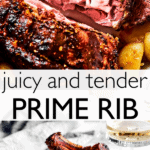
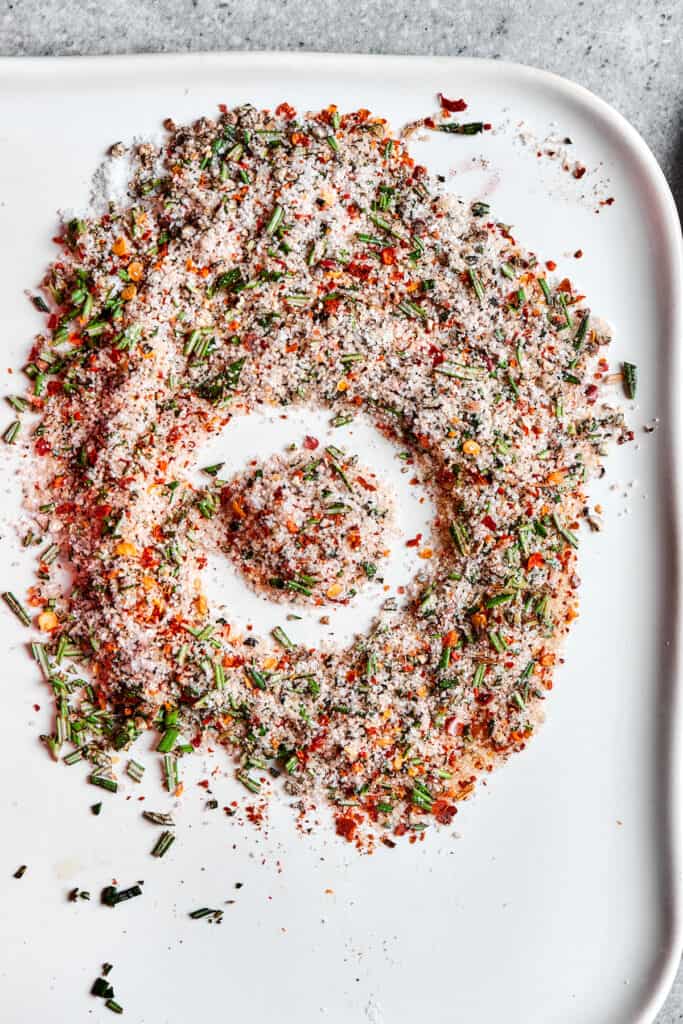
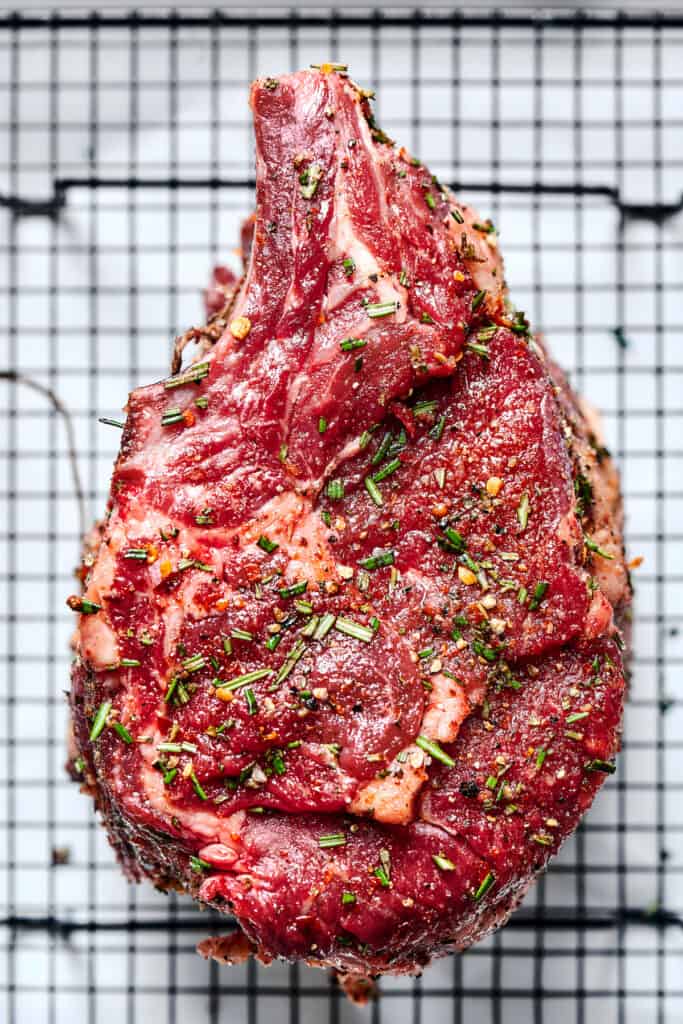
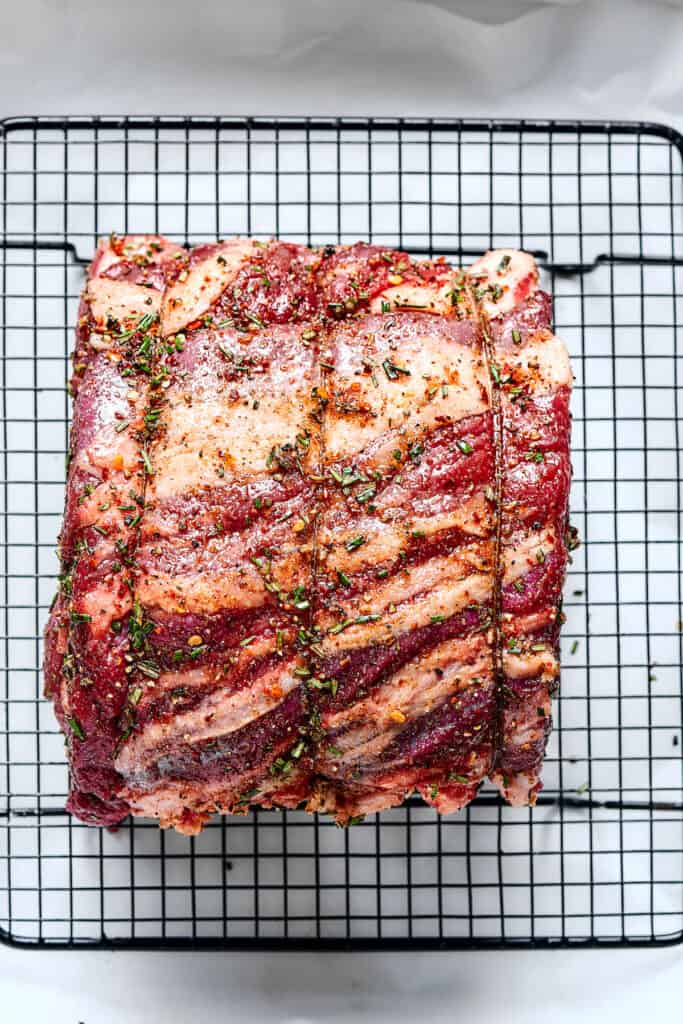
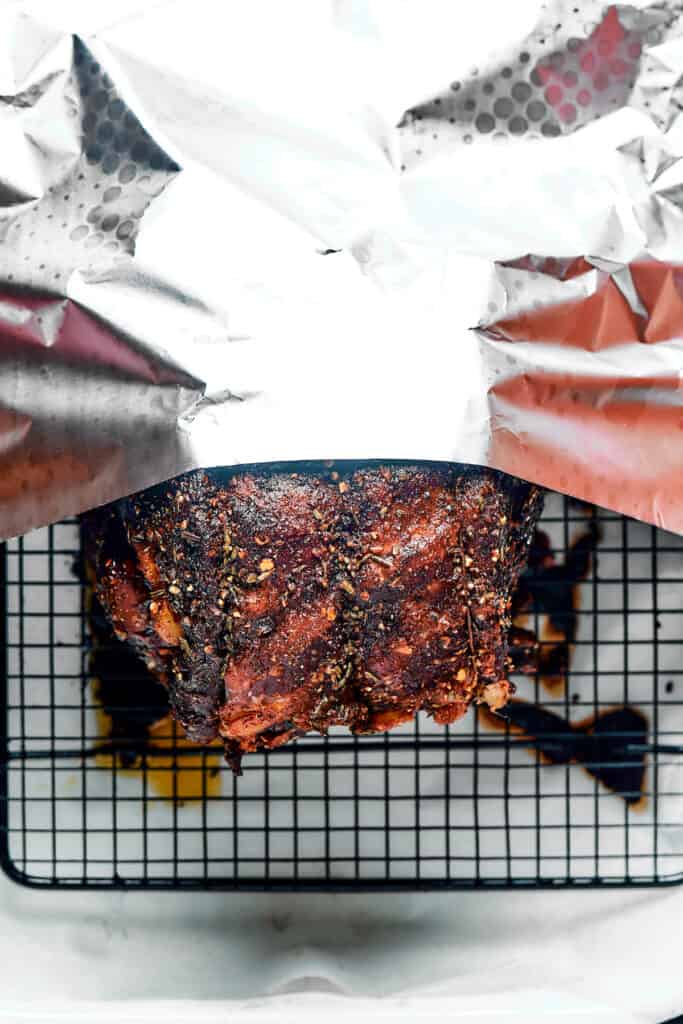
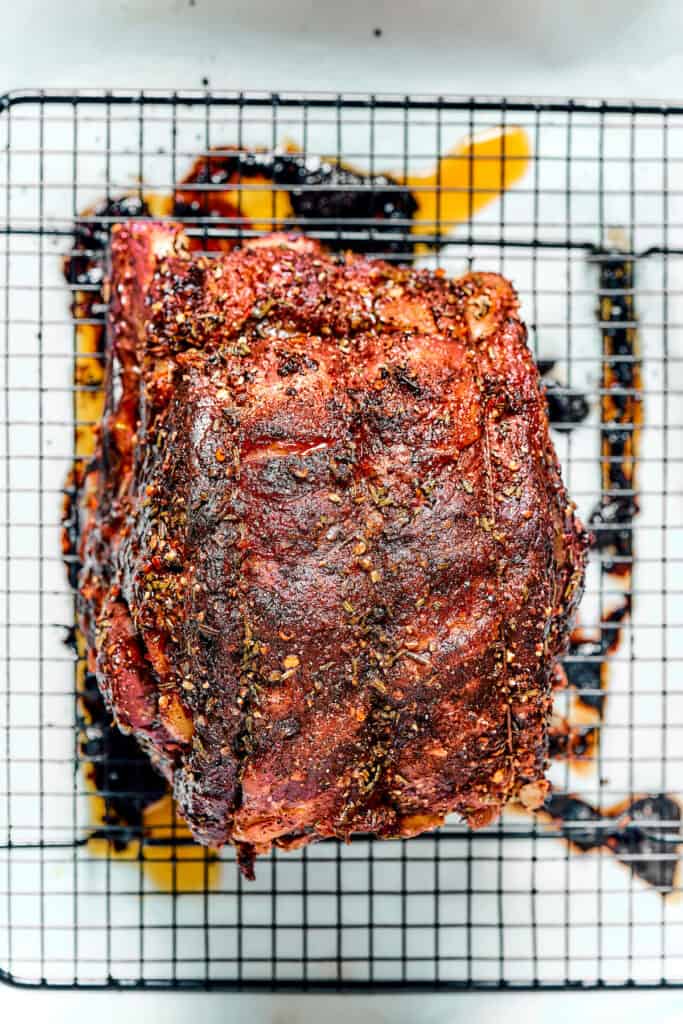
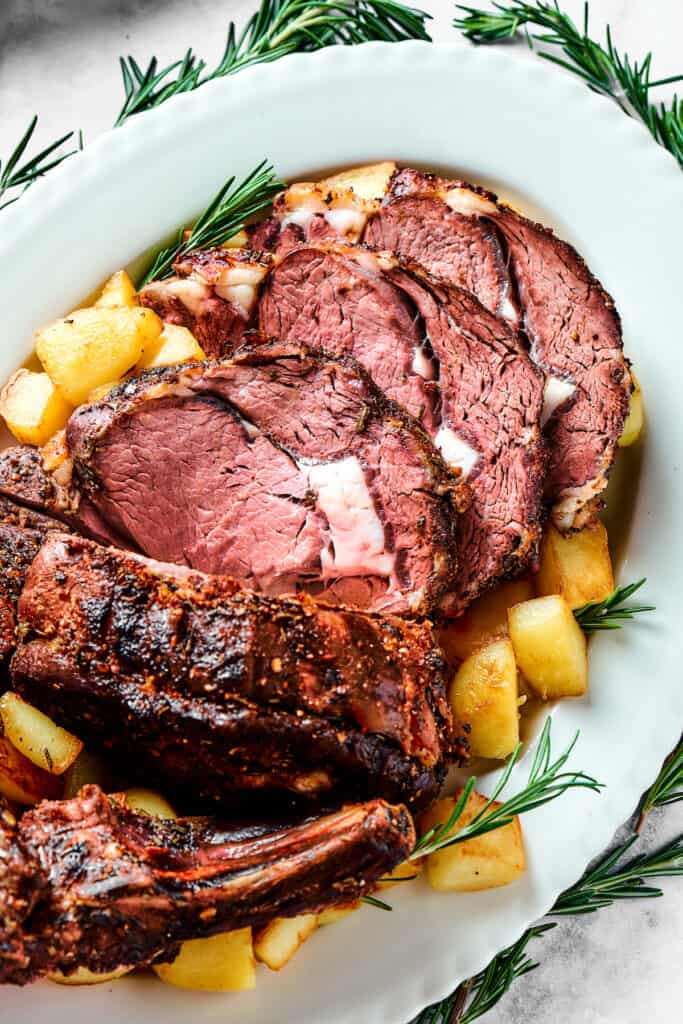
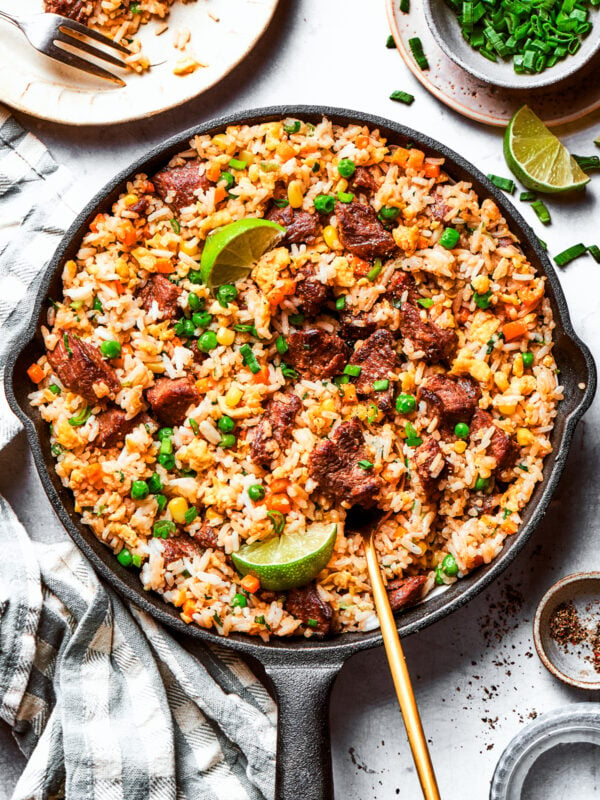
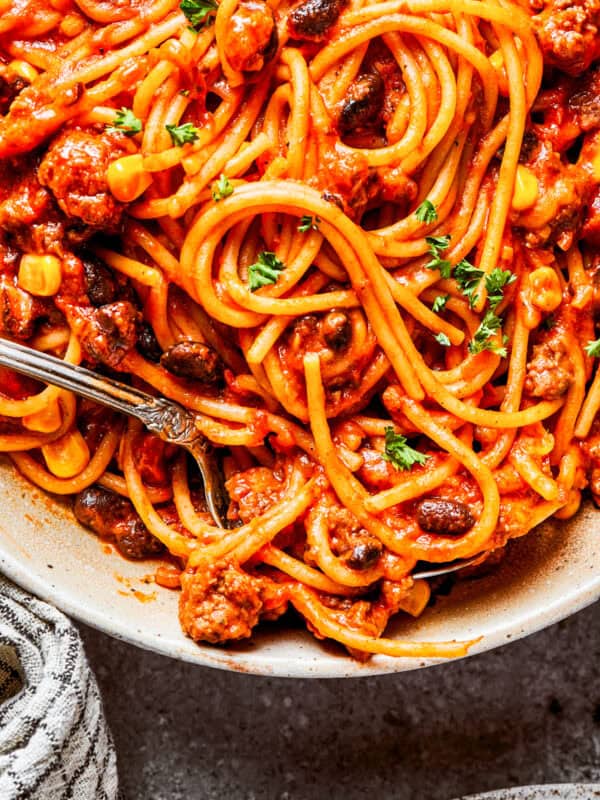
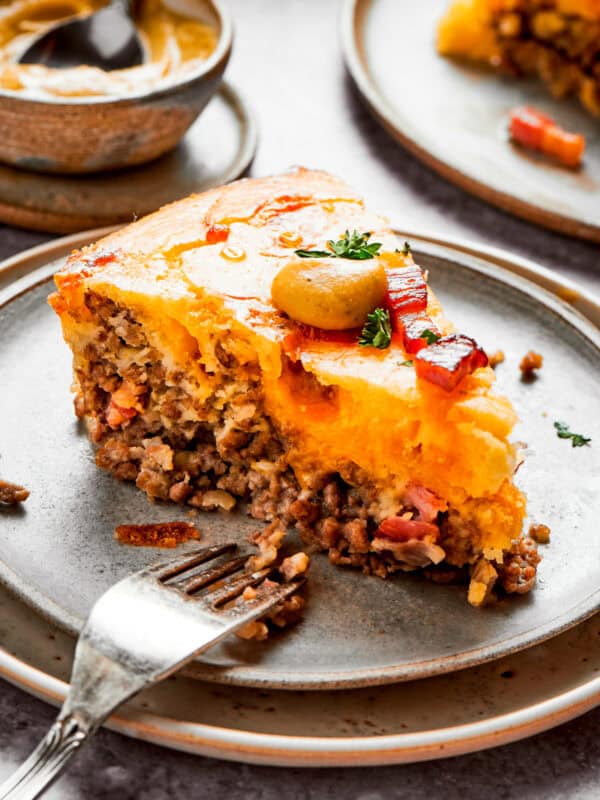
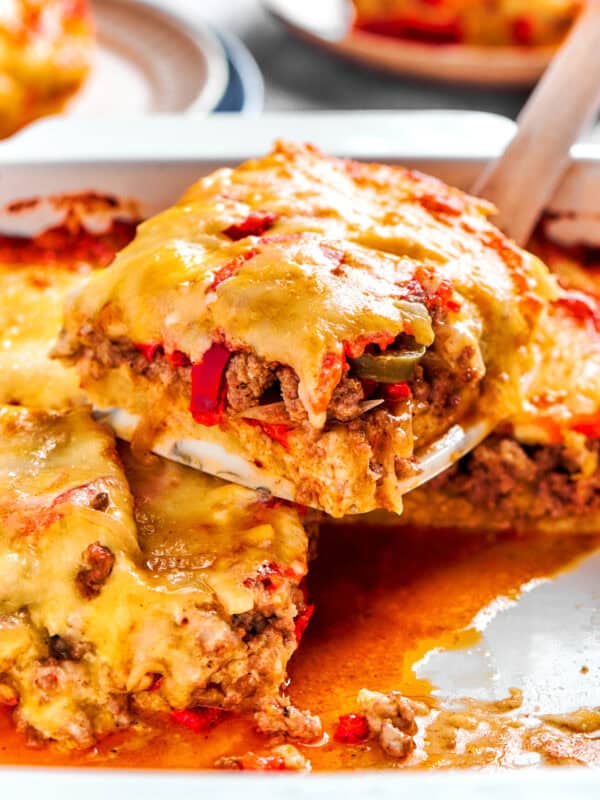
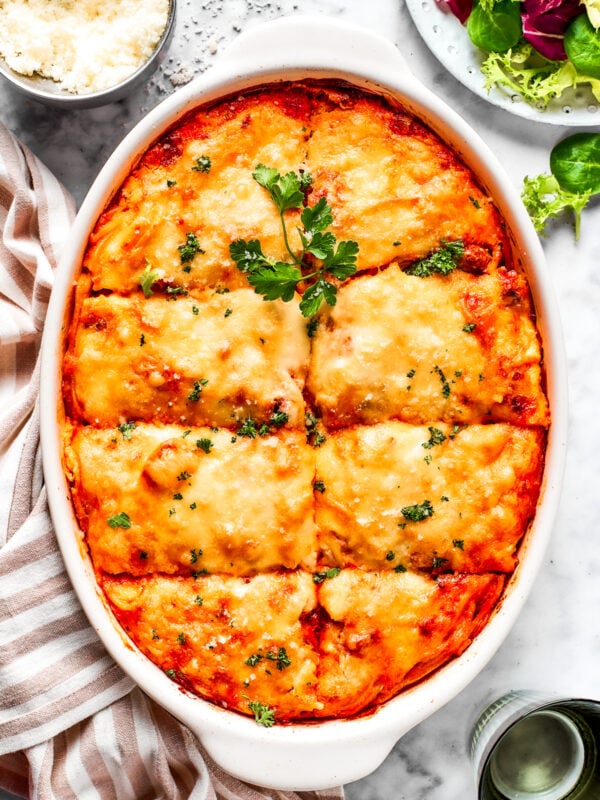








You can beat a perfectly seasoned and cooked prime rib. There’s nothing like it. I can’t wait to try this recipe.
I hope you love it! Thank YOU! 🙂
Family absolutely loved this for our New Year’s dinner. I will be making this every year for the foreseeable future!
That’s wonderful! I’m very happy you and your family loved it! Thank YOU! 🙂